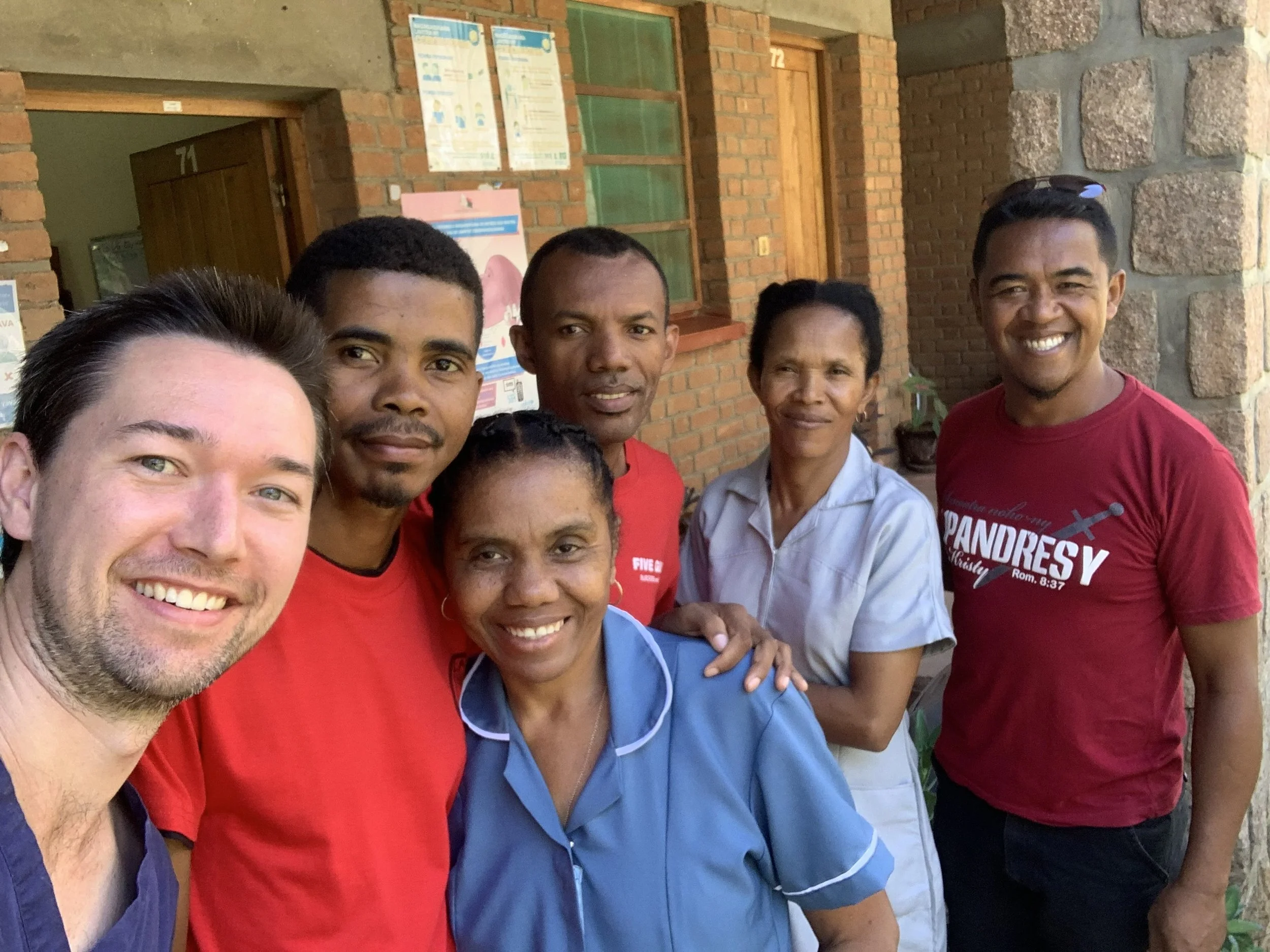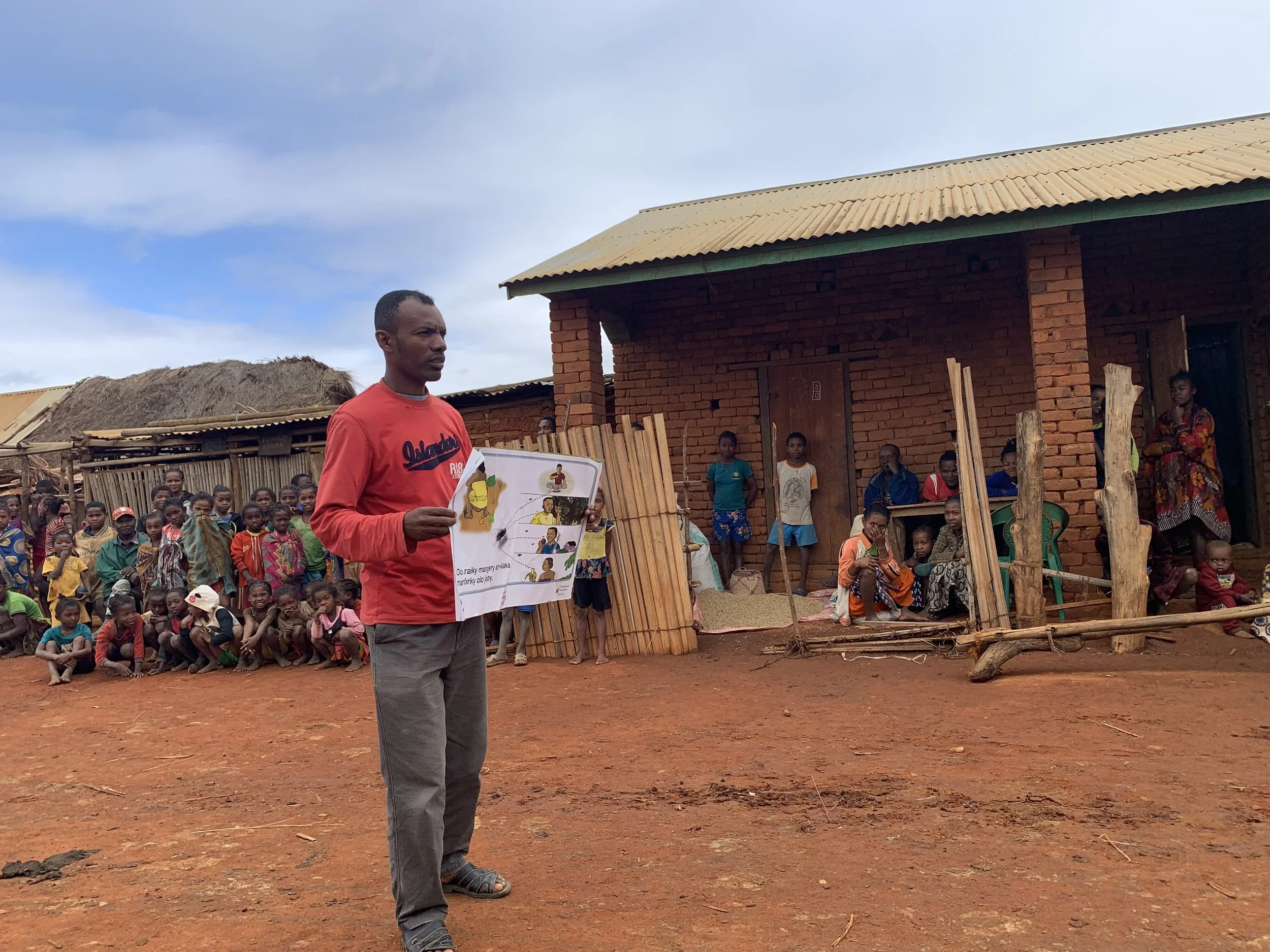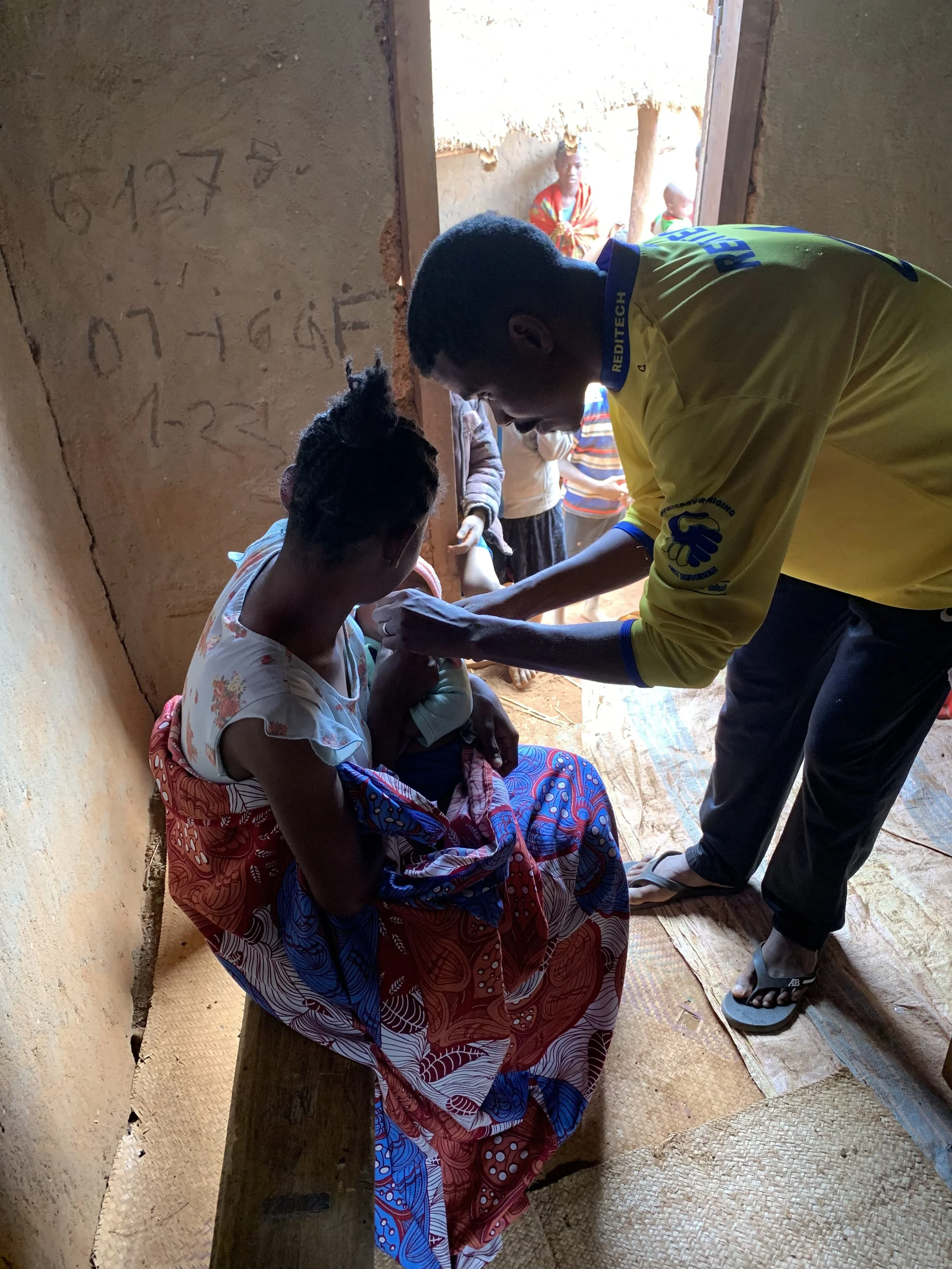by Dr Brendan Petersen
Australian Missionary Doctor in Mandritsara
There aren’t too many days here in Mandritsara where it’s cold enough to wear a jumper. But at 5 o’clock this morning, it feels like a good idea! The sun isn’t up yet but there’s already a glow starting to appear on the horizon heralding its arrival. I’m on my way to meet members of the community health team before we head off together by motorbike to Manja, a village about 20km from Mandritsara.
Brendan and the team
The road to Manja
The main purpose of our trip is to bring vaccinations for the children and pregnant women in Manja (and surrounding villages). This is done every 2 months as part of our role in assisting with the government national vaccination programme. In Australia, where I previously worked as a GP, education and misinformation are the main barriers to vaccination. But here we were about to encounter a whole range of other barriers and obstacles to overcome.
So off we go, 2 people per moto, through the already busy streets of Mandritsara, before turning east to begin our journey to Manja. It’s slow going. There are stretches of road (a term I use loosely) which we can travel along with relative ease. But others, due to mud or dust or erosion, require a very careful approach.
The countryside around Manja
We pass through villages dotted throughout the countryside, connected by the red dirt road we’re traveling along. We pass groups of people heading the other way. Some travelling on a wooden cart pulled by oxen. Others on foot (and often barefoot) with a heavy load of what they might be able to sell at the market in Mandritsara. We cross rivers, travel up (and then down) terrifyingly narrow and winding roads over a mountain ridge, pass by altars for animal sacrifice and the tombs of ancestors, before we finally arrive in Manja.
Villages near Manja
Here we are welcomed into the home of one of the two volunteer community health workers in the village. There is no doctor or nurse for some distance, so over many years the community health team has trained and provided ongoing education for pairs of community health workers in a number of the villages we work with. Now, if you’re like me, you might be fooled into thinking that the vaccination process and health education was next on the agenda (after all, that was the purpose of our visit!). But instead, I received a fresh insight into Malagasy culture and the steps required to visit this village well and in a culturally sensitive way.
So, we sat and we waited. I attempted to join the small talk with my limited Malagasy (there’s only so many things one can say about the weather, food or one’s health!). Then, bit by bit, the formalities began. The community health volunteer arrived for greetings and “kabarys” (the typical speech for any occasion). He was followed by some of the traditional leaders in the village, including a man whose responsibility is blowing a whistle to gather the rest of the community. He would prove to be very helpful!
Then, after some more greetings and kabarys, along with a snack, we move onto a tour of the village, which doubles as an informal health inspection. Like most villages we visit, there is no electricity or running water here. There is a school, with a single classroom for all the children who are able to attend. We ask about toilets (I use that word loosely), of which there are 2, and for one we can’t find the key. This is for the whole community of approximately 1000 people. Most practice open defaecation.
Teaching about toilets
After our tour, and sampling the local oranges (Manja is known for its oranges!), a meeting with the community is organised. The man with the whistle springs into action, and slowly men, women and children of all ages gather around where we are seated. We’re introduced and presented to the community, with more speeches. The team I’m with has prepared some songs and a short drama about the importance of good hygiene (including using a toilet), much to the enjoyment of the kids. This is followed by a gospel presentation – there is no church yet in Manja and traditional ancestral beliefs are very strong here, but due to the strong trust that has been built here over time there is an open door for gospel proclamation.
Vaccinations in Progress
So now it’s time for vaccines! The children up until the age of 1 are gathered and any pregnant women as well. They’re screened to see who is due to get their vaccines today, and quite efficiently the whole group is seen to in less than an hour. Then we’ve been invited to lunch - rice and chicken - so we sit down again to share a meal with the community health worker and some of the key leaders in the community.
A final farewell speech, and then off we go, to begin the journey back to Mandritsara. Crossing the same rivers and mountains, seeing familiar faces returning on foot from their day at the market in Mandritsara. All in time to arrive back at the hospital before sunset. Part of me wondered if it was all incredibly inefficient - a whole day for only 1 hour of vaccines. But at the same time, I had seen and learned so much, including gaining insights into why our community health team is so effective. And we had been able to proclaim the gospel there.
The Community Health Team
The team know the right way to do things culturally. They emphasise building relationships with every community they visit. This has been key to beginning gospel conversations and presentations in so many villages. They model Christian living - not taking bribes, careful and pure relationships especially with the women in the villages, and honouring their word when they say that they’ll be coming back. This approach and the relationships developed along the way have resulted in the planting of more than 60 village churches or cell groups. And there are many more villages where good soil is being prepared but the seeds planted are yet to bear fruit.
Prayer Points
Please pray for Manja, one of these villages with deeply ingrained ancestral beliefs and a strong opposition to the gospel, and the many villages like it.
Pray for our community health team, for their ongoing holiness, unity, safety and wisdom as they engage in life changing physical and spiritual works.
And join us in praising God for the enormous impact the work of the community health team has had on Mandritsara and its many surrounding villages.
As we joined together to pray on Saturday, please continue praying for the work in Mandritsara.
Feel free to use this prayer diary to help you in your prayers. Download Here.










